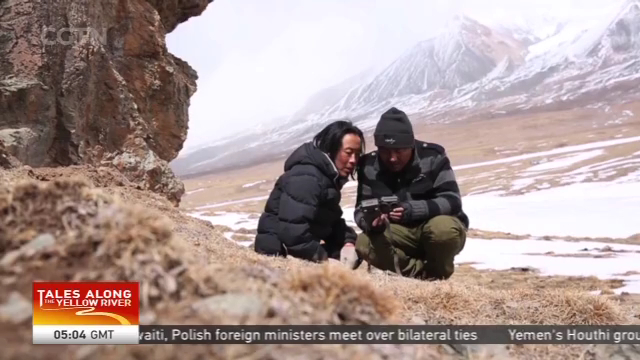
13:31, 26-Aug-2019
Holy Nature: Tibetan nomads, NGO help preserve ecosystem at river source
Updated
14:01, 26-Aug-2019

Protecting the source of China's Yellow River isn't just the government's responsibility. Outside the Sanjiangyuan National Nature Reserve, local Tibetan nomads also play a definitive role in river and ecosystem protection, as it represents so much of who they are. CGTN reporter Xu Mengqi has more.
A pristine beauty that few have ever seen.
High on the Tibetan plateau, this summer pasture at the foot of Qinghai's tallest mountain Amnye Machen is where Sangdhan and his family have been herding their livestock for generations.
But amid the peace and tranquility, something secretly troubles the Tibetan nomad.
Amnye Machen, the snowcapped mountain that has long been a destination for Buddhist pilgrimages has been melting.
With the biggest glaciers at the headwaters of the Yellow River, the mountain's ecological significance has prompted NGOs to start tracking its changes.
AWANG JIKMED FOUNDER, PLATEAU NATURE CONSERVANCY "After our observation and interviews with the local people living here, there are big changes with the glaciers. And the glaciers have been retreating within the last 10 years."
Among Tibetan nomads, the legend goes, when Amnye Machen's glaciers disappear, the god of the holy mountain will be gone and so will his blessings.
So when Awang, founder of a nature conservancy started working in this region, Sangdhan and his fellow nomads were eager to jump onboard.
SANGDHAN TIBETAN NOMAD "When there's more snow on the mountain, it makes me very happy, but when there's less snow, it makes me really sad."
XU MENGQI GOLOG TIBETAN AUTONOMOUS PREFECTURE, QINGHAI "For Tibetans, Amnye Machen is one of the most important sacred mountains and for hundreds of years, they've been protecting it in their own ways. Now scientists and conservationists have found out such cultural values and religious beliefs are pivotal in preserving not only the source of the Yellow River, but also the bio-diversity here."
As part of his new side job, Sangdhan now regularly surveys Amnye Machen for signs of snow leopards, a flagship species on the plateau and an important indicator of the status of its ecosystem.
AWANG JIKMED FOUNDER, PLATEAU NATURE CONSERVANCY "Because local people not only live in this area, they also know better than anyone else about the changes of their environment, the nature. So they can provide very important information."
Back at Sangdhan's pasture, I asked him whether the tune he was singing had a name.
He says it's just a folk song about the mountains and rivers in one's hometown and there's no name.
I thought that, was beautiful.
XMQ, CGTN, in Golog, Qinghai.
SITEMAP
Copyright © 2018 CGTN. Beijing ICP prepared NO.16065310-3
Copyright © 2018 CGTN. Beijing ICP prepared NO.16065310-3